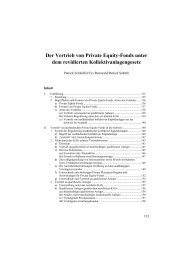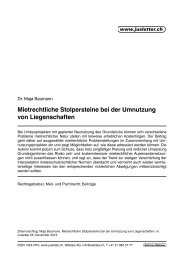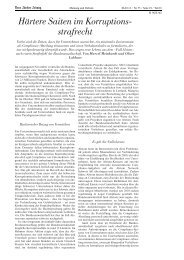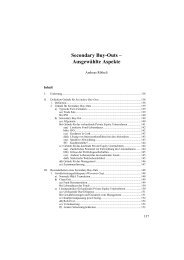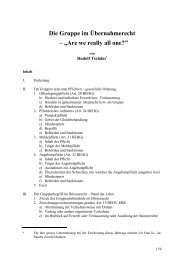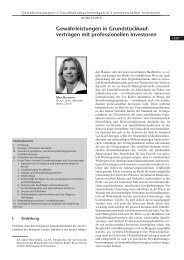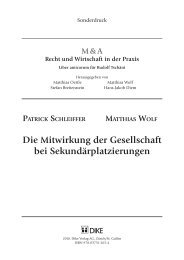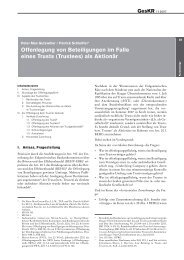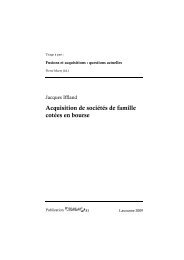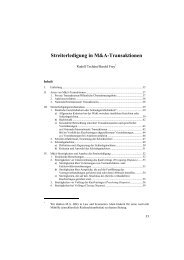Cross-border financial serv - Lenz & Staehelin
Cross-border financial serv - Lenz & Staehelin
Cross-border financial serv - Lenz & Staehelin
You also want an ePaper? Increase the reach of your titles
YUMPU automatically turns print PDFs into web optimized ePapers that Google loves.
Shelby R. du Pasquier / Philipp Fischer – <strong>Cross</strong>-<strong>border</strong> <strong>financial</strong> <strong>serv</strong>ices in and from Switzerland GesKR 4 2010<br />
14 clients (with the advisor being permitted to treat the<br />
fund, as opposed to the fund’s investors, as its client)<br />
and (B) avoid holding themselves out to the public in the<br />
USA as investment advisors (former Section 203 (b) (3)<br />
of the Advisors Act). This exemption has been repelled<br />
by Title IV of the Dodd-Frank Act, the so-called Registration<br />
Act. Non-U.S. investment advisors to private<br />
funds 170 active in the USA will be compelled to register<br />
with the SEC before July 21, 2011 (i.e., one year after the<br />
enactment of the Dodd-Frank Act), except if one of the<br />
following two narrowly-tailored exemptions is met:<br />
• The «foreign private advisor exemption» is available<br />
to a non-U.S. investment advisor (A) with no<br />
place of business in the USA, (B) not more than 14<br />
U.S. clients (investors in the United States in private<br />
funds advised by the adviser must also be counted<br />
against this cap), (C) for which the aggregate AUM<br />
attributable to such U.S. clients represent less than<br />
USD 25 million (or such higher amount as deemed<br />
appropriate by the SEC) and (D) who does not hold<br />
themselves out to the public in the USA as investment<br />
advisors (Section 403(2) of the Dodd-Frank<br />
Act). This new exemption thus retains the previously-applicable<br />
limit of 14 clients, but modifies it by a<br />
requirement to count U.S. investors in private funds<br />
towards the numerical limit and by imposing a USD<br />
25 million cap on AUM attributable to U.S. clients<br />
or investors.<br />
• An exemption from the registration duty is also<br />
available to (U.S. or non-U.S.) investment advisors<br />
that act solely as advisors to private funds and whose<br />
«AUM in the U.S.» are less than USD 150 million<br />
(Section 408 of the Dodd-Frank Act). Although such<br />
advisors are exempt from registration, they still are<br />
subject to a record-keeping and a reporting obligation,<br />
whose exact scope is yet to be defined. The<br />
terms «AUM in the U.S.» are yet to be defined by<br />
the SEC.<br />
It is worth noting at this juncture that the Dodd-Frank<br />
Act, unlike the CISA (see Section II.6.1a above) or the<br />
AIFM Directive (see Section III.2.2 above) does not<br />
contain any reverse solicitation exemption. The Dodd-<br />
Frank Act applies a strict numerical test, regardless of<br />
the party, investor or advisor, that initiated the investment<br />
process. Historically, the SEC’s policy has been<br />
to limit its extraterritorial reach by providing that non-<br />
U.S. registered investment advisors must comply with<br />
the substantive duties under the Advisors Act (e.g., extensive<br />
record-keeping obligations 171 ) with respect to<br />
their U.S. clients only. It is for the time being unclear<br />
170 Pursuant to Section 3 of the Investment Company Act, the term<br />
«private fund» encompasses hedge funds, private equity funds<br />
and other private investment vehicles.<br />
171 See for instance Section 204 of the Advisors Act.<br />
whether this policy will be maintained in the context of<br />
the Registration Act.<br />
IV. Outlook and conclusion<br />
Prudential supervision in the <strong>financial</strong> sector has generally<br />
focused on limiting the disastrous economic consequences<br />
deriving from a failure of a <strong>financial</strong> institution.<br />
In this respect, Switzerland has traditionally relied<br />
on the principle of home country control. The logical<br />
corollary to this approach is that today the provision of<br />
cross-<strong>border</strong> <strong>financial</strong> <strong>serv</strong>ices into Switzerland is to a<br />
large extent unregulated. This approach, along with the<br />
absence of regulatory entry barriers, are signs of confidence<br />
in the strength and competitiveness of the Swiss<br />
<strong>financial</strong> industry.<br />
Other jurisdictions, in particular in the EU and the<br />
USA, have taken routes that are in sharp contrast to the<br />
Swiss approach. In these jurisdictions, the provision of<br />
cross-<strong>border</strong> <strong>serv</strong>ices is severely constrained under the<br />
principle of host country control. In some instances, one<br />
wonders whether consumer protection, which is often<br />
invoked to justify the regulation of cross-<strong>border</strong> <strong>financial</strong><br />
<strong>serv</strong>ices in these jurisdictions, is not used to conceal<br />
other objectives, such as the protection of the local <strong>financial</strong><br />
industry or the maximization of tax income.<br />
In the aftermath of the 2008 <strong>financial</strong> crisis, several jurisdictions<br />
have added teeth to their regulatory framework<br />
regarding cross-<strong>border</strong> <strong>serv</strong>ices. As a reaction, the<br />
Swiss supervisor has somewhat shifted its approach of<br />
the problem and is increasingly assessing compliance<br />
with foreign (non-Swiss) rules under the (Swiss) fit and<br />
proper test, which applies to most Swiss licensed <strong>financial</strong><br />
institutions. This trend is likely to continue. The<br />
new set of double taxation treaties ratified by Switzerland,<br />
which incorporate Article 26 of the OECD Model<br />
Tax Convention, will allow foreign States to obtain additional<br />
information with respect to taxpayers, but also<br />
with respect to the <strong>serv</strong>ices rendered to them by Swiss<br />
<strong>financial</strong> intermediaries. It is likely that the additional<br />
information thus available to foreign regulators will<br />
lead to further inquiries into the cross-<strong>border</strong> activities<br />
of Swiss institutions. As a corollary, the initiation of<br />
proceedings abroad will prompt the FINMA to review<br />
more and more frequently whether the requirements of<br />
the fit and proper test have been complied with.<br />
All Swiss <strong>financial</strong> institutions are now forced to take<br />
into account these fundamental changes and adapt their<br />
business models, structures and operations accordingly.<br />
The risk deriving from the enforcement of foreign rules<br />
governing the cross-<strong>border</strong> business is heightened for<br />
those <strong>financial</strong> institutions which, in parallel to the offshore<br />
business, have substantial onshore operations in<br />
the relevant jurisdictions.<br />
459<br />
Aufsätze



